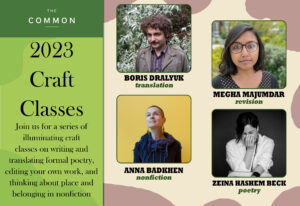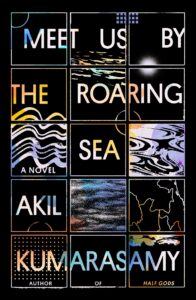Give your writing a boost this winter. Join The Common for a series of craft classes with these literary luminaries.
-
-
Boris Dralyuk: “Extraordinary Measures: Translating Formal Poetry” [register]
-
Anna Badkhen: “Writing about Place: Geography, belonging, historical context, and the implications of our gaze” [register]
-
Megha Majumdar: “Demystifying Publishing and Being Your Own Best Editor” [register]
-
Zeina Hashem Beck: “The Ghazal and the Poetic Leap” [register]
-
Each class includes a craft talk and Q&A with the guest author, generative exercises and discussion, and a take-home list of readings and writing prompts. Recordings will be available after the fact for participants who cannot attend the live event.















